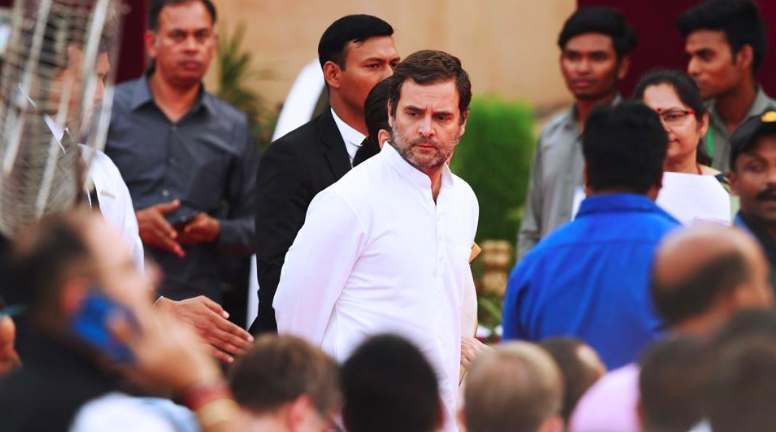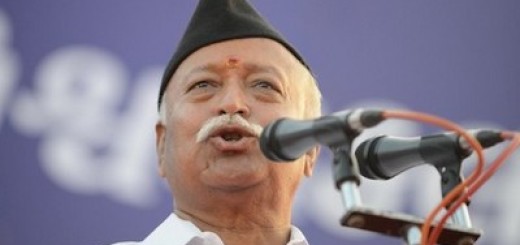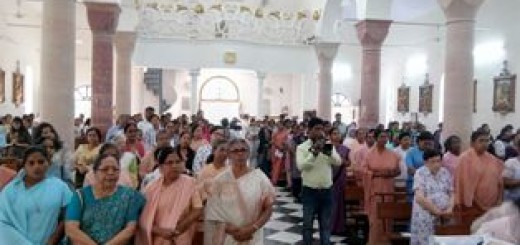An opposition-mukt India is proof of a looming crisis: writes Rajdeep Sardesai

The checks and balances of democracy are under strain. Where will the challenge to any overreach come from?
Rahul Gandhi’s decision to give up the party presidentship has created a vacuum which is unlikely to be filled without internal turmoil (AFP)
Is this going to be the triumph of darkness for the Indian democracy? All the regional satraps — Mamata, Mayawathi, Navin and the Left in Kerala – are in tatters and made speechless. All happened because all towering leaders in the states wanted to become the PM! Have they at least learned that unity alone of opposistion parties is their only road to victory?
Congress alone is the only party which has an all India foot hold and yet the worst incapable of reforming itself. Rahul has opted to stay out. Is there none outside the Gandhi family to lead the Congress? Then why do those close to Rahul insist on those allied to dynasty, but failed and elderly leaders, to replace him?
Blind ballot voting of all youthful leaders in the party from North to South should be enforced to discover the right leader for the Party. If Congress claims to be a democratic party, this is what should be done and with out delay to solve the crisis! james kottoor, editor CCV.
Rajdeep Sardesai in Hindustan Times, Jun 21, 2019
Please read below the analysis of Rajdeep’s Column
After being sworn in as a member of Parliament (MP) amid slogans, a senior opposition leader lamented: “Looks like this is a 10 year mandate for Modi rule.” The MP’s apprehensionwas not surprising: the opposition benches wore a distinctly deserted look and many familiar faces were missing.
If the Lok Sabha offers a mirror to the state of our republic, then we are entering a unipolar age, one where diversity is giving way to a saffronised polity. Never before, perhaps, in the history of the Indian Parliament has the opposition looked so bedraggled and dispirited. Not even in 1984 when Rajiv Gandhi won an even bigger mandate than Narendra Modi.
At least then, both within Parliament and outside, there were an array of strong opposition leaders like Atal Bihari Vajpayee, LK Advani, George Fernandes and Chandrashekhar to raise their voices, not to forget regional satraps like NT Rama Rao and Ramakrishna Hegde, who had given the Congress a bloody nose in state elections. Even in the Jawaharlal Nehru and Indira Gandhi era, there were always a galaxy of opposition leaders who could be counted upon to speak up with passionate fervour.
Contrast that with the opposition predicament today. The Congress appears to be drifting into a phase of chaos and uncertainty. Rahul Gandhi’s decision to give up the party presidentship has created a vacuum which is unlikely to be filled without internal turmoil. The Left, once at the forefront of agitational politics, is now reduced to just three MPs.
The Trinamool Congress, the third largest party in Parliament, is still recovering from the dramatic breach of its Bengal fortress by the Bharatiya Janata Party (BJP). The Bahujan Samaj Party(BSP)-Samajwadi Party (SP) alliance has broken even before it could really become a viable alternative. Regional parties like Jagan Reddy’s YSR Congress, K Chandrashekar Rao’s Telangana Rashtra Samithi and Naveen Patnaik’s Biju Janata Dal are looking to cut deals with the Centre to keep their state interests intact.
Which leaves the 17th Lok Sabha looking increasingly like an opposition-mukt Parliament in which a hegemonical party with a dominant leader can call all the shots. There appears to be quite simply no one, both within the government and outside, who can remotely challenge the ruling establishment. Even restive allies like Nitish Kumar’s Janata Dal United or Uddhav Thackeray’s Shiv Sena, after being denied plum ministerial berths, have little choice this time but to suffer in silence and fall in line.
This opposition-mukt legislature is perhaps symptomatic of a deeper institutional crisis in which the checks and balances of democracy are now under strain. As the 2019 election campaign showed, large sections of the media have simply failed to offer a mirror to the government. The judiciary’s role, too, has come under the scanner in recent times with charges of impropriety.
The deleterious effects of this model of centralised decision-making have already been felt in the 16th Lok Sabha when even the Union budget was passed without debate. When attempts are initiated to change the demographics of the Jammu and Kashmir assembly, when the economy seems to be faltering and gross domestic product numbers are dodgy, who will raise a red flag? At least in the previous Parliament, the Rajya Sabha was able to offer some resistance. The fact that the government didn’t have a majority in the Upper House meant that it wasn’t easy for the ruling party to always have its way. Next year, that too could change with the BJP inching towards a majority in the Upper House.
So where will the challenge come from to any potential abuse of power? In the Rajiv years, it came from within the government when VP Singh broke away in 1987 to raise the banner of revolt. Indira Gandhi’s sweeping victory in 1971 eventually saw the opposition find its muscle when the imposition of Emergency galvanised the dissenting voices of protest.
Modi 2.0 is arguably more powerful than even Indira Gandhi in her pomp and the political opposition more discredited now. Any robust questioning then of government policies may have to be initiated by civil society at the risk of being dubbed “anti-national”: then be it the economic challenges or any attempts made to tinker with the Constitution, independent voices need to stand up and be counted.
Post script: On the first day of the 17th Lok Sabha, Prime Minister Modi asked the opposition to forget their small numbers and speak freely in Parliament. It was a fine, statesman-like gesture but, as one opposition member pointed out, Modi likes to be so at the start of every session. Will the PM walk the talk this time, or will affairs of Parliament become a ritualistic exercise? (Rajdeep Sardesai is a senior journalist and author)
















